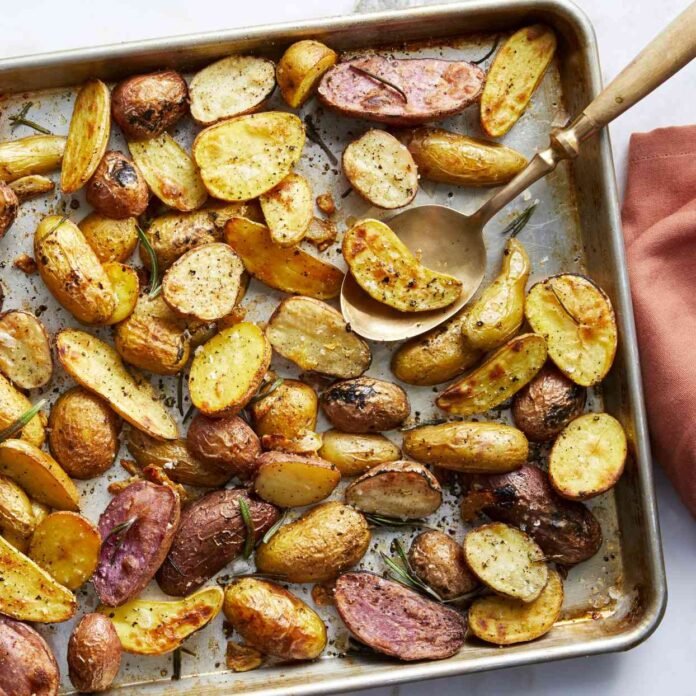Potatoes often get a bad rap when it comes to weight loss. They are commonly perceived as a high-carb food that could derail weight management efforts. However, when prepared and consumed thoughtfully, potatoes can actually fit into a weight loss diet. Let’s explore some essential tips for incorporating potatoes into your weight loss journey without compromising your goals.
First and foremost, it’s crucial to reconsider how potatoes are cooked. Frying potatoes, as in the case of French fries or potato chips, adds unnecessary calories and unhealthy fats. Instead, opt for healthier cooking methods like boiling, baking, or steaming. These methods preserve the natural nutrients in potatoes without adding extra fat. For instance, baked potato wedges can be a tasty and lower-calorie alternative to their fried counterparts.
Another important tip is to manage the glycemic index (GI) of potatoes. GI measures how quickly a food raises blood sugar levels. Potatoes typically have a high GI, which can cause rapid spikes in blood sugar and insulin levels. However, there is a trick to lowering the GI of potatoes. According to nutritionist Deepshikha Jain, cooling cooked potatoes for 6-7 hours before consuming them can reduce their GI. This process converts some of the starch into resistant starch, which has a lower impact on blood sugar.
Incorporating potatoes into your diet in a balanced way is also essential. Avoid pairing potatoes with other high-carb foods like roti, rice, or bread. Instead, combine potatoes with protein-rich foods, which can help stabilize blood sugar levels and promote satiety. For example, a potato salad with grilled chicken or a baked potato topped with Greek yogurt can be a satisfying and nutritious meal.
Portion control plays a significant role when including potatoes in a weight loss plan. While potatoes can be part of a healthy diet, consuming them in large quantities can contribute to excess calorie intake. Focus on moderate portions and pair potatoes with plenty of vegetables and lean proteins. This approach helps maintain a balanced diet while enjoying the versatility of potatoes.
It’s also wise to consider the variety of potatoes you choose. Sweet potatoes, for example, have a lower GI compared to regular potatoes and are packed with additional nutrients like beta-carotene and fiber. Opting for sweet potatoes occasionally can provide a nutritious alternative while keeping your meals varied.
Additionally, mindful eating practices can enhance the benefits of including potatoes in your diet. Paying attention to portion sizes and savoring each bite can help prevent overeating. Eating slowly and enjoying the flavors of your meal can also aid in digestion and increase overall satisfaction with your meal.
Lastly, always consult with a healthcare professional or dietitian before making significant changes to your diet, especially if you have underlying health conditions. Expert guidance ensures that your dietary choices align with your individual health needs and weight loss goals.
Potatoes do not have to be a dietary enemy on your weight loss journey. By avoiding frying, managing the glycemic index, and combining potatoes with protein while practicing portion control, you can enjoy this versatile vegetable without derailing your progress. Remember to incorporate potatoes mindfully and consult with experts to ensure that your diet remains balanced and effective. With these strategies, you can enjoy potatoes in a way that supports your weight loss goals and overall well-being.
When including potatoes in your weight loss plan, it’s also beneficial to pay attention to the types of dishes you prepare. Potato-based soups, for example, can be a filling and nutritious choice. Opt for recipes that use minimal added fats and focus on vegetables and lean proteins to make a hearty, low-calorie meal. Potato soup made with a clear broth and plenty of fresh vegetables can be both satisfying and supportive of weight loss goals.
Another strategy is to use potatoes as a base for healthy, low-calorie snacks. For instance, baked potato skins can be topped with a variety of healthy ingredients like salsa, Greek yogurt, or fresh herbs. These alternatives provide flavor and nutrition without excessive calories or unhealthy fats. Additionally, using potatoes in combination with other vegetables in dishes like vegetable hash or mixed veggie stews can enhance the nutritional value of your meals while keeping them low in calories.
It’s also worth considering the timing of your potato consumption. Eating potatoes earlier in the day, such as at breakfast or lunch, can be beneficial for managing hunger throughout the day. Starting the day with a balanced meal that includes potatoes can provide sustained energy and help regulate appetite, reducing the likelihood of unhealthy snacking later on. For example, a breakfast with roasted potatoes and a side of eggs can be both filling and supportive of weight management.
Incorporating herbs and spices into your potato dishes can also enhance flavor without adding extra calories. Using a variety of herbs like rosemary, thyme, and paprika can make your meals more enjoyable and satisfying. These seasonings add flavor and may help reduce the need for added fats or high-calorie sauces, making your potato dishes both delicious and diet-friendly.
Lastly, remember that variety is key to a successful weight loss journey. While potatoes can be a nutritious part of your diet, it’s important to include a wide range of vegetables and whole foods to ensure you’re getting a diverse array of nutrients. Combining potatoes with other vegetables like leafy greens, peppers, and beans can help create well-rounded meals that support overall health and weight loss.
By following these additional tips, you can make the most of potatoes as part of a balanced and effective weight loss strategy. Whether you enjoy them in soups, snacks, or as a base for other healthy dishes, potatoes can fit into your diet in a way that supports your goals while providing satisfying and flavorful options.

